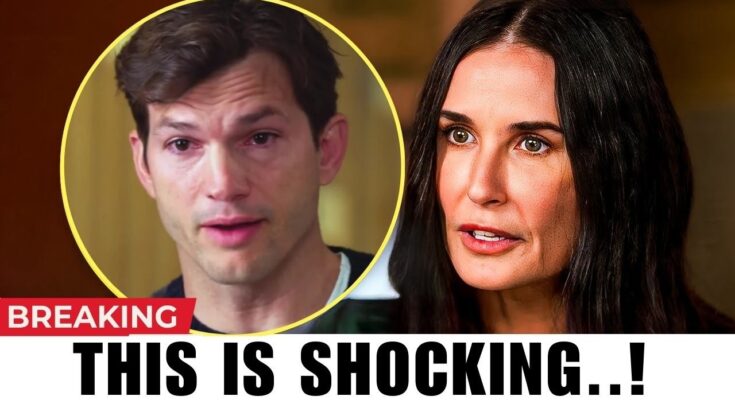Demi Moore’s Heartbreaking Revelation: The Unbearable Pressure That Shattered a Hollywood Fairy Tale
For years, the narrative surrounding Demi Moore and Ashton Kutcher’s divorce was one the public thought it understood: a classic tale of a younger husband’s infidelity ending a May-December romance. But in a raw and profoundly moving reflection, Moore, now 62, has peeled back the layers of that painful period, revealing a story far more complex and heartbreaking than previously imagined. It wasn’t just about betrayal; it was about a deep, soul-crushing yearning that ultimately broke her.
In her 2019 memoir, Inside Out, Moore first began to detail the struggles of her marriage to Kutcher, who is 15 years her junior. However, in recent interviews promoting her new film and reflecting on her life, she has articulated the core wound with newfound clarity and poignancy. The central tragedy, as she now describes it, was her desperate desire to have a child with him.
“I believed that having a baby would solidify our connection,” Moore has revealed, a sentiment that echoes with a devastating universality. “I was so desperate to create this family, this unit that felt like it was missing.” This longing became the focal point of her life, transforming from a hope into an obsession that consumed her identity and, ultimately, her marriage.
The All-Consuming Journey of IVF
The path to conceive was not an easy one. Moore has spoken openly about undergoing in vitro fertilization (IVF) treatments, a process that is physically grueling, hormonally chaotic, and emotionally draining even under the most supportive circumstances. She describes subjecting her body to the relentless cycle of injections, appointments, and hope, only to be met with repeated disappointment.
“It was a brutal process on my body and on my psyche,” she confessed. The failure of each cycle wasn’t just a medical setback; it was a personal failure in her eyes, a crack in the foundation of her fairy tale. Friends and sources close to the couple at the time noted that the dynamic began to shift. What was once a vibrant, playful partnership became increasingly defined by schedules, medical procedures, and a palpable pressure.
A relationship that had been famously playful and publicly affectionate on social media—helping to pioneer the concept of the “couple selfie”—began to buckle under the weight of this singular goal. The fun and spontaneity that initially defined their union were replaced by clinical routines and the silent grief of negative pregnancy tests.
The Crushing Blow of Infidelity
While Moore was immersed in the arduous process of trying to build their family, the outside world was about to deliver the hammer blow. In 2011, rumors of Kutcher’s infidelity began to swirl, culminating in very public allegations of his affairs. For Moore, this was not just a betrayal of their vows; it was a betrayal of the future she was literally killing herself to create.
The juxtaposition was cruel and absolute. While she was enduring injections and hormonal turmoil for the sake of their potential child, he was allegedly unfaithful. The message she internalized, as many would in her position, was that her efforts, her love, and her dream were not enough. The infidelity didn’t just break her heart; it shattered the narrative she had built for her life.
“It was a tsunami,” Moore said of the period surrounding the split. “There’s no way to get out of a tsunami. You’re just in it and you’re being dragged and if you can just remember to float, that’s your only chance.”
A Reflection on Identity and Self-Worth
Looking back, Moore’s heartbreaking account is about more than a failed marriage. It’s a cautionary tale about tying one’s self-worth and happiness to an external outcome, especially one as fragile as conception. Therapists often warn of the strain fertility issues can place on a relationship.
Dr. Jane Greer, a New York-based relationship expert and author, notes, “When one partner, particularly in this case the woman, takes on the entire burden of conception, it can create a dangerous power dynamic. She may feel solely responsible for the ‘success’ of the relationship, while the partner can feel sidelined or pressured, sometimes leading them to act out. The shared dream becomes an individual’s burden, and that is incredibly difficult for any union to survive.”
Moore has since done the hard work of untangling her sense of self from that experience. She speaks now from a place of hard-won wisdom about the importance of self-love and not seeking validation from a partner. “I had to learn to love myself enough to set boundaries and to walk away from what was no longer serving me,” she has stated.
Her story, while uniquely hers in its Hollywood glare, resonates with countless individuals who have faced similar struggles with fertility, betrayal, and the loss of a dreamed-of future. By finally opening up with such vulnerability, Demi Moore has done more than just share gossip; she has given a voice to a specific kind of heartbreak and, in doing so, has shown that even after the most devastating tsunamis, it is possible to learn to float, then swim, and finally, to find solid ground again. Her heartbreaking revelation is ultimately a story of survival.



